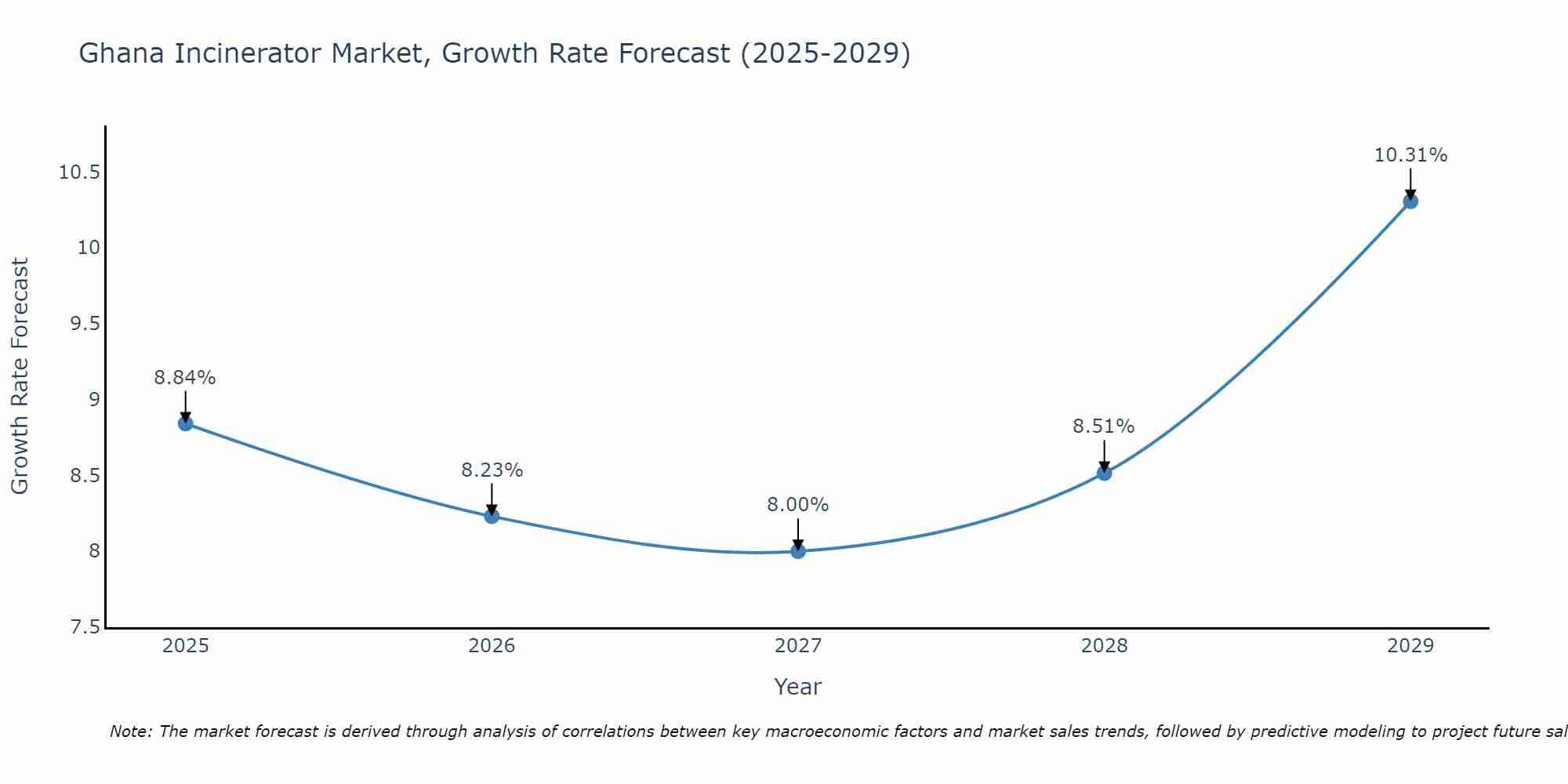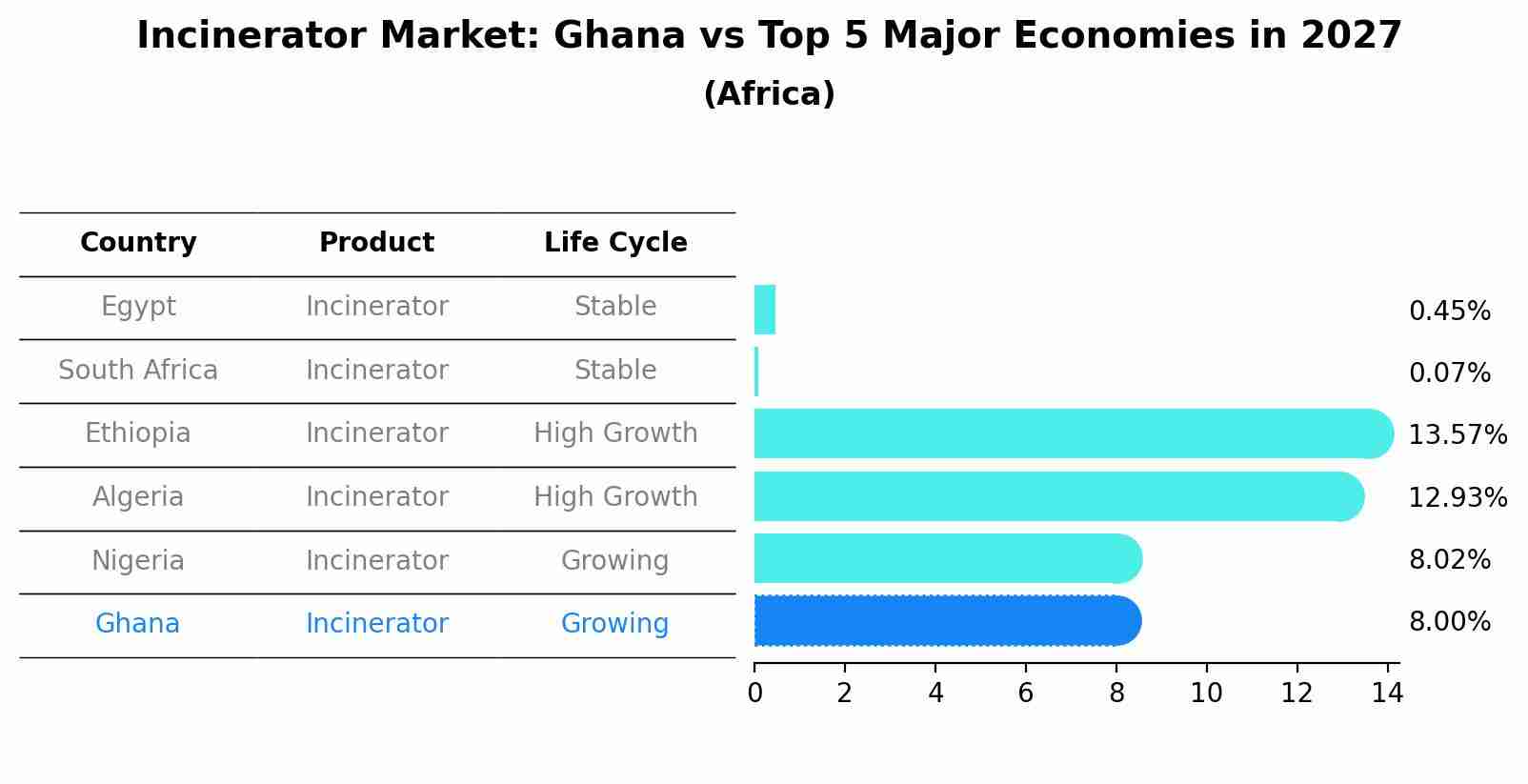Ghana Incinerator Market (2025-2031) Outlook | Trends, Revenue, Share, Size, Analysis, Industry, Growth, Companies, Forecast & Value
| Product Code: ETC130177 | Publication Date: Jun 2021 | Updated Date: Jun 2025 | Product Type: Report | |
| Publisher: 6Wresearch | Author: Ravi Bhandari | No. of Pages: 70 | No. of Figures: 35 | No. of Tables: 5 |
Ghana Incinerator Market Size Growth Rate
The Ghana Incinerator Market is projected to witness mixed growth rate patterns during 2025 to 2029. The growth rate starts at 8.84% in 2025 and reaches 10.31% by 2029.

Incinerator Market: Ghana vs Top 5 Major Economies in 2027 (Africa)
By 2027, the Incinerator market in Ghana is anticipated to reach a growth rate of 8.00%, as part of an increasingly competitive Africa region, where Egypt remains at the forefront, supported by South Africa, Ethiopia, Algeria and Nigeria, driving innovations and market adoption across sectors.

Ghana Incinerator Market Overview
The Ghana Incinerator Market is experiencing steady growth driven by increasing focus on waste management and environmental sustainability. With rising urbanization and industrialization, there is a growing need for efficient waste disposal solutions, leading to a significant demand for incinerators in the country. The market is characterized by a mix of international and local players offering a range of products catering to various capacities and applications. Key factors influencing market growth include government initiatives promoting clean energy solutions, stringent regulations on waste disposal, and the need to reduce landfill waste. As Ghana aims to improve its waste management infrastructure, the incinerator market is expected to witness further expansion with opportunities for technological advancements and innovative solutions to address the country`s waste management challenges.
Ghana Incinerator Market Trends
The Ghana incinerator market is witnessing a growing demand for advanced and environmentally friendly incineration technologies. With increasing awareness about the importance of proper waste management and the need to reduce pollution, there is a shift towards incinerators that are energy-efficient, produce lower emissions, and incorporate advanced monitoring and control systems. Additionally, there is a rising trend towards decentralized incineration solutions to cater to the waste management needs of smaller communities and industries. Key players in the market are focusing on developing incinerators that comply with international standards and regulations, as well as offering services such as maintenance and training to enhance customer experience and satisfaction. Overall, the Ghana incinerator market is evolving towards more sustainable and efficient solutions to address the country`s waste management challenges.
Ghana Incinerator Market Challenges
In the Ghana Incinerator Market, some of the key challenges include limited awareness about the benefits of incineration technology among potential users, inadequate funding for the implementation and maintenance of incineration facilities, and regulatory barriers that may hinder the adoption of incineration solutions. Additionally, the lack of proper infrastructure and skilled personnel to operate and manage incineration facilities pose significant challenges in the market. Environmental concerns and community opposition to incineration projects also present obstacles to market growth. Overcoming these challenges will require stakeholder collaboration, increased education on the benefits of incineration, financial support for projects, and compliance with regulatory standards to ensure sustainable and effective waste management solutions in Ghana.
Ghana Incinerator Market Investment Opportunities
The Ghana incinerator market presents promising investment opportunities due to the increasing need for proper waste management solutions in the country. With rapid urbanization and industrialization leading to a surge in waste generation, there is a growing demand for efficient incineration facilities to handle and dispose of waste effectively. Investing in modern incineration technologies and systems that adhere to environmental regulations can be lucrative. Additionally, government initiatives to promote sustainable waste management practices and the potential for public-private partnerships in the sector further enhance the investment prospects. Collaborating with local authorities and stakeholders to establish incineration facilities or upgrading existing ones can be a strategic move for investors looking to capitalize on the evolving waste management landscape in Ghana.
Ghana Incinerator Market Government Policy
The Ghanaian government has implemented policies aimed at regulating the waste management sector, including incineration. The Environmental Protection Agency (EPA) is the regulatory body responsible for issuing permits and monitoring incinerator operations to ensure compliance with environmental standards. The government encourages the adoption of clean technologies and best practices in waste management, including incineration, to minimize the impact on public health and the environment. Additionally, there are regulations in place to promote the proper disposal of hazardous waste through authorized facilities, including incinerators. Overall, the government`s policies in Ghana emphasize sustainable waste management practices and aim to improve the overall efficiency and effectiveness of incineration processes in the country.
Ghana Incinerator Market Future Outlook
The Ghana incinerator market is poised for steady growth in the coming years due to increasing awareness about proper waste management practices and the need for more sustainable solutions to handle growing waste volumes. The government`s initiatives to improve waste management infrastructure, coupled with rising urbanization and industrialization, are expected to drive the demand for incinerators in the country. Additionally, the growing focus on environmentally friendly waste disposal methods and regulations regarding waste management are likely to further boost the market. As Ghana continues to strive towards a cleaner and healthier environment, the incinerator market is forecasted to expand, providing opportunities for market players to offer advanced incineration technologies and solutions to meet the rising demand.
Key Highlights of the Report:
- Ghana Incinerator Market Outlook
- Market Size of Ghana Incinerator Market, 2021
- Forecast of Ghana Incinerator Market, 2031
- Historical Data and Forecast of Ghana Incinerator Revenues & Volume for the Period 2021 - 2031
- Ghana Incinerator Market Trend Evolution
- Ghana Incinerator Market Drivers and Challenges
- Ghana Incinerator Price Trends
- Ghana Incinerator Porter's Five Forces
- Ghana Incinerator Industry Life Cycle
- Historical Data and Forecast of Ghana Incinerator Market Revenues & Volume By Product Type for the Period 2021 - 2031
- Historical Data and Forecast of Ghana Incinerator Market Revenues & Volume By Moving Grate for the Period 2021 - 2031
- Historical Data and Forecast of Ghana Incinerator Market Revenues & Volume By Static Hearth, Furnace and Multiple Hearth for the Period 2021 - 2031
- Historical Data and Forecast of Ghana Incinerator Market Revenues & Volume By Rotary Kiln for the Period 2021 - 2031
- Historical Data and Forecast of Ghana Incinerator Market Revenues & Volume By Fluidized Bed for the Period 2021 - 2031
- Historical Data and Forecast of Ghana Incinerator Market Revenues & Volume By End-user for the Period 2021 - 2031
- Historical Data and Forecast of Ghana Incinerator Market Revenues & Volume By Municipal Sector for the Period 2021 - 2031
- Historical Data and Forecast of Ghana Incinerator Market Revenues & Volume By Industrial Sector for the Period 2021 - 2031
- Ghana Incinerator Import Export Trade Statistics
- Market Opportunity Assessment By Product Type
- Market Opportunity Assessment By End-user
- Ghana Incinerator Top Companies Market Share
- Ghana Incinerator Competitive Benchmarking By Technical and Operational Parameters
- Ghana Incinerator Company Profiles
- Ghana Incinerator Key Strategic Recommendations
Frequently Asked Questions About the Market Study (FAQs):
Ghana Incinerator |
1 Executive Summary |
2 Introduction |
2.1 Key Highlights of the Report |
2.2 Report Description |
2.3 Market Scope & Segmentation |
2.4 Research Methodology |
2.5 Assumptions |
3 Ghana Incinerator Market Overview |
3.1 Ghana Country Macro Economic Indicators |
3.2 Ghana Incinerator Market Revenues & Volume, 2021 & 2031F |
3.3 Ghana Incinerator Market - Industry Life Cycle |
3.4 Ghana Incinerator Market - Porter's Five Forces |
3.5 Ghana Incinerator Market Revenues & Volume Share, By Product Type, 2021 & 2031F |
3.6 Ghana Incinerator Market Revenues & Volume Share, By End-user, 2021 & 2031F |
4 Ghana Incinerator Market Dynamics |
4.1 Impact Analysis |
4.2 Market Drivers |
4.3 Market Restraints |
5 Ghana Incinerator Market Trends |
6 Ghana Incinerator Market, By Types |
6.1 Ghana Incinerator Market, By Product Type |
6.1.1 Overview and Analysis |
6.1.2 Ghana Incinerator Market Revenues & Volume, By Product Type, 2018 - 2027F |
6.1.3 Ghana Incinerator Market Revenues & Volume, By Moving Grate, 2018 - 2027F |
6.1.4 Ghana Incinerator Market Revenues & Volume, By Static Hearth, Furnace and Multiple Hearth, 2018 - 2027F |
6.1.5 Ghana Incinerator Market Revenues & Volume, By Rotary Kiln, 2018 - 2027F |
6.1.6 Ghana Incinerator Market Revenues & Volume, By Fluidized Bed, 2018 - 2027F |
6.2 Ghana Incinerator Market, By End-user |
6.2.1 Overview and Analysis |
6.2.2 Ghana Incinerator Market Revenues & Volume, By Municipal Sector, 2018 - 2027F |
6.2.3 Ghana Incinerator Market Revenues & Volume, By Industrial Sector, 2018 - 2027F |
7 Ghana Incinerator Market Import-Export Trade Statistics |
7.1 Ghana Incinerator Market Export to Major Countries |
7.2 Ghana Incinerator Market Imports from Major Countries |
8 Ghana Incinerator Market Key Performance Indicators |
9 Ghana Incinerator Market - Opportunity Assessment |
9.1 Ghana Incinerator Market Opportunity Assessment, By Product Type, 2021 & 2031F |
9.2 Ghana Incinerator Market Opportunity Assessment, By End-user, 2021 & 2031F |
10 Ghana Incinerator Market - Competitive Landscape |
10.1 Ghana Incinerator Market Revenue Share, By Companies, 2021 |
10.2 Ghana Incinerator Market Competitive Benchmarking, By Operating and Technical Parameters |
11 Company Profiles |
12 Recommendations |
13 Disclaimer |
- Single User License$ 1,995
- Department License$ 2,400
- Site License$ 3,120
- Global License$ 3,795
Search
Thought Leadership and Analyst Meet
Our Clients
Related Reports
- Afghanistan Apparel Market (2026-2032) | Growth, Outlook, Industry, Segmentation, Forecast, Size, Companies, Trends, Value, Share, Analysis & Revenue
- Canada Oil and Gas Market (2026-2032) | Share, Segmentation, Value, Industry, Trends, Forecast, Analysis, Size & Revenue, Growth, Competitive Landscape, Outlook, Companies
- Germany Breakfast Food Market (2026-2032) | Industry, Share, Growth, Size, Companies, Value, Analysis, Revenue, Trends, Forecast & Outlook
- Australia Briquette Market (2025-2031) | Growth, Size, Revenue, Forecast, Analysis, Trends, Value, Share, Industry & Companies
- Vietnam System Integrator Market (2025-2031) | Size, Companies, Analysis, Industry, Value, Forecast, Growth, Trends, Revenue & Share
- ASEAN and Thailand Brain Health Supplements Market (2025-2031) | Strategy, Consumer Insights, Analysis, Investment Trends, Opportunities, Growth, Size, Share, Industry, Revenue, Segments, Value, Segmentation, Supply, Forecast, Restraints, Outlook, Competition, Drivers, Trends, Demand, Pricing Analysis, Competitive, Strategic Insights, Companies, Challenges
- ASEAN Bearings Market (2025-2031) | Strategy, Consumer Insights, Analysis, Investment Trends, Opportunities, Growth, Size, Share, Industry, Revenue, Segments, Value, Segmentation, Supply, Forecast, Restraints, Outlook, Competition, Drivers, Trends, Demand, Pricing Analysis, Competitive, Strategic Insights, Companies, Challenges
- Europe Flooring Market (2025-2031) | Outlook, Share, Industry, Trends, Forecast, Companies, Revenue, Size, Analysis, Growth & Value
- Saudi Arabia Manlift Market (2025-2031) | Outlook, Size, Growth, Trends, Companies, Industry, Revenue, Value, Share, Forecast & Analysis
- Uganda Excavator, Crane, and Wheel Loaders Market (2025-2031) | Strategy, Consumer Insights, Analysis, Investment Trends, Opportunities, Growth, Size, Share, Industry, Revenue, Segments, Value, Segmentation, Supply, Forecast, Restraints, Outlook, Competition, Drivers, Trends, Demand, Pricing Analysis, Competitive, Strategic Insights, Companies, Challenges
Industry Events and Analyst Meet
Whitepaper
- Middle East & Africa Commercial Security Market Click here to view more.
- Middle East & Africa Fire Safety Systems & Equipment Market Click here to view more.
- GCC Drone Market Click here to view more.
- Middle East Lighting Fixture Market Click here to view more.
- GCC Physical & Perimeter Security Market Click here to view more.
6WResearch In News
- Doha a strategic location for EV manufacturing hub: IPA Qatar
- Demand for luxury TVs surging in the GCC, says Samsung
- Empowering Growth: The Thriving Journey of Bangladesh’s Cable Industry
- Demand for luxury TVs surging in the GCC, says Samsung
- Video call with a traditional healer? Once unthinkable, it’s now common in South Africa
- Intelligent Buildings To Smooth GCC’s Path To Net Zero


















